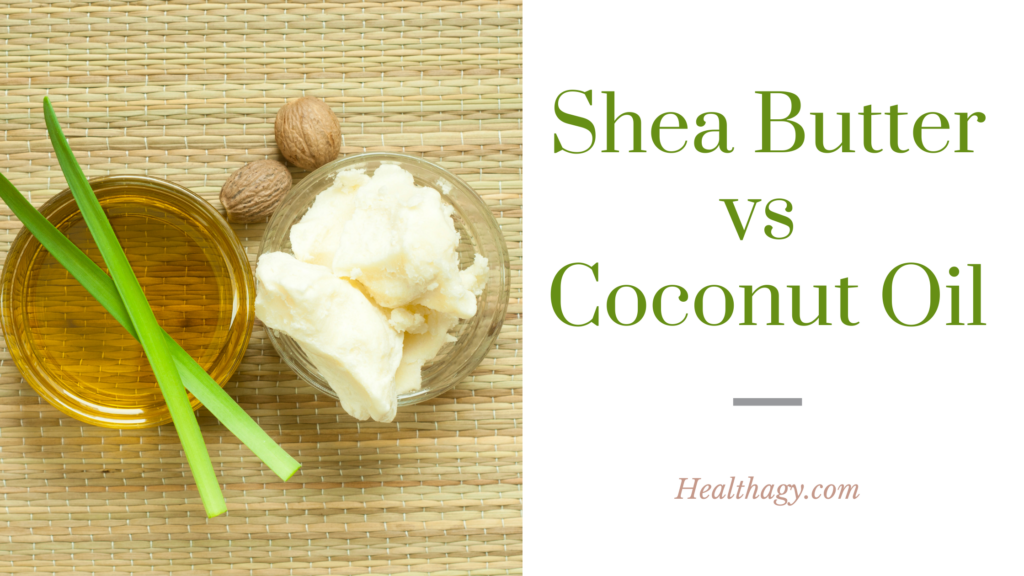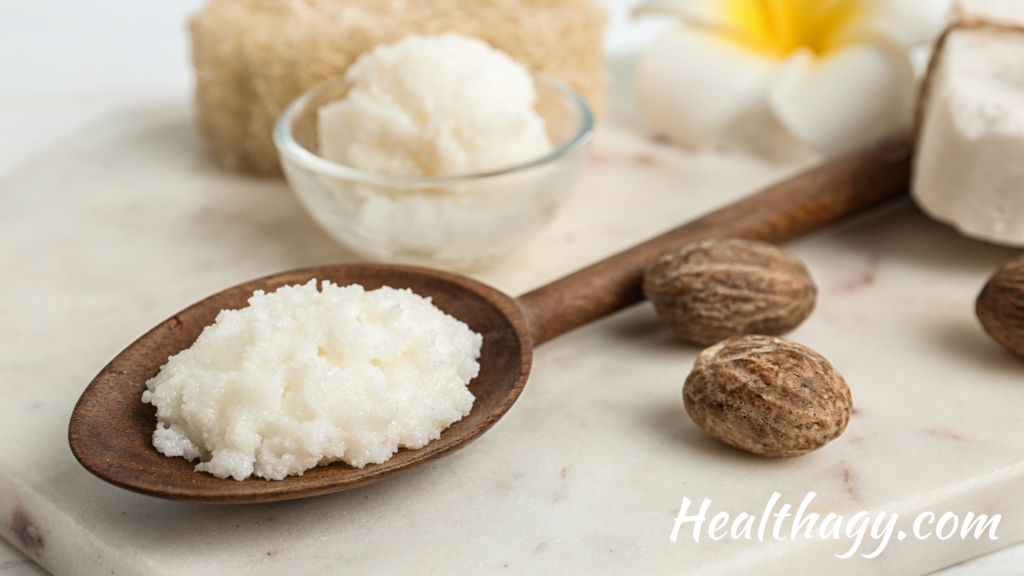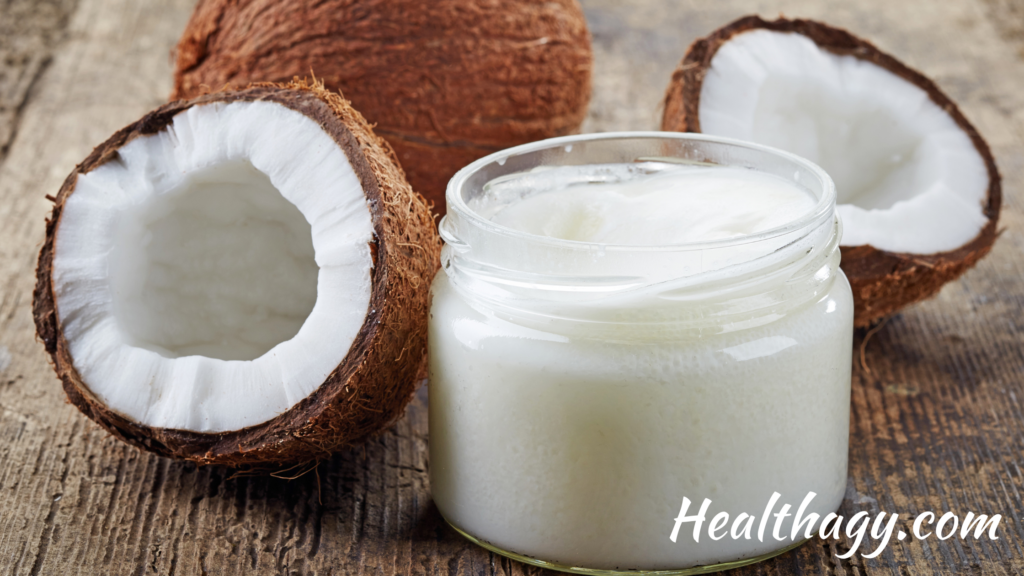
Shea butter and coconut oil are two time-proven hair and skin moisturizers used for centuries to keep hair and skin glowing, soft, and moisturized. They’ve both become widely popular beauty products, being used in natural form and marketed as the base in many commercial beauty and skincare products. So is one better than the other? Which is best for your skin? Which one should you be using?
Shea Butter vs Coconut Oil
The most notable difference between shea butter vs coconut oil is that shea butter is suitable for all skin types while coconut oil is not. Coconut oil is typically not recommended for people with oily skin or acne-prone skin as it may lead to clogged pores or acne breakouts.
This post will further compare shea butter vs coconut oil, share the pros and cons of each, and why you may want to choose one over the other.

What is Shea Butter?
Shea butter is cultivated from the fat that is extracted from the nuts of the shea tree. The fat is carefully extracted so that the shells and debris are filtered out. What’s left is smooth, rich pure raw shea butter- that is unrefined.
Shea butter has been widely used in cosmetics for centuries, dating back to ancient Egypt, where it is believed that Cleopatra, known for her beauty having clay jars filled with shea butter.
Shea butter is commonly found in skin care products and hair care products- from body butter and lip balm to soap and hair masks. It’s an excellent moisturizer suitable for all skin types.
Although Cleopatra was known for her use of shea butter, shea trees are not native to Egypt. Instead, shea trees are native to West Africa and East Africa, grown in what is referred to as the shea tree belt- stretching throughout 19 countries across the African continent, from Senegal to South Sudan.
Shea Butter Benefits
Unrefined shea butter has significant nutrients and protections that the skin loves- from medicinal to cosmetic; it’s no wonder shea butter continues to withstand the test of time as an asset to beauty.
Known to help boost collagen production and cellular turnover, shea butter is used to help reduce, prevent or minimize the appearance of acne scars, stretch marks, wrinkles, and age spots. All while providing a natural has SPF protection of 6-10, which helps provide mild protection from UV damage.
Shea butter has anti-inflammatory properties, which help reduce swelling, stinging, and redness, giving it some medicinal properties. It can be used to help soothe and heal several skin problems such as irritated or severely dry skin, soothe rashes, eczema, and dry skin.
One of the unique qualities that set shea butter apart, making it the ideal moisturizer, is appropriate for all skin types, even sensitive skin. There have been no known allergic reactions to using shea butter topically.
Shea Butter Properties
Full of antioxidants and vitamins such as vitamin A, vitamin E, and vitamin F, which help protect against free radicals, promote circulation, collagen production, and healthy skin cell growth.
Shea butter also contains a number of fatty acids that provide it’s deep moisturizing qualities. Linoleic acid, palmitic acid, stearic acid, and oleic acid; working together they help balance and moisturize the skin without leaving it oily.
Refined vs Unrefined Shea Butter
Unrefined shea butter is raw, still in its natural state, from an ivory color to a dirty yellow color, depending on the region and specific tree it was harvested from. Unrefined shea butter will have an earthy smell that can be off-putting at first, although many acquire the smell and begin to enjoy it as the smell of a natural product. Others create DIY body butter by adding essential oils and whipping it with other oils such as aloe vera and jojoba oil.
Refined shea butter is processed with bleach and chemicals to give it a more appealing whiter color and remove any smell while adding fragrance. While refined shea butter can be more aesthetically pleasing, it comes with a trade-off as most of the nutrients and properties that your skin loves are stripped away during the process.
When using shea butter for medicinal, anti-aging, and or cosmetic appearance purposes, it is important to use the best shea butter-a premium-grade A, 100% raw and unrefined product.

What is Coconut Oil?
Coconuts have been widely used and cultivated for thousands of years, primarily in more tropical areas where they grow plentiful on palm trees. Coconut oil is extracted from the meat of coconut fruit. Coconut oil is very versatile in that it can be used in cooking, soaps, cosmetics, and medicinal care. In fact, many native cultures have a use for all parts of the coconut, from the meat to the shells and even the husks; no part is ever wasted.
Like shea butter, coconut oil makes an excellent moisturizer for many skin types- the one caveat being those who have oily skin. With coconut oil, less is more, as it can become greasy when too much is applied. The oil can also build up and clog pores- which is why it isn’t recommended for oily skin that is prone to breakouts.
If you are suffering from skin irritation caused by bacteria or fungus such as athlete’s foot, coconut oil may provide relief due to its anti-microbial properties.
Coconut oil is best applied after a bath as it acts as a sealant, helping skin seal in and retains its natural moisture. Coconut oil does not have quite the amount of vitamins that shea butter does, most notably the abundance of vitamin E, making it such a great moisturizer.
Which is Better for Your Skin Shea Butter or Coconut Oil?
They are both great options and gentle on skin, both great for moisturizing, healing, and soothing skin. Some may have a personal preference based on their skin type and other conditions. In general, if you have to choose one over the other, shea butter would edge out as the winner due to its deep moisturizing benefits, being anti-inflammatory, and working well for all skin types.
But if you don’t have to choose, why not choose both! Many find a benefit in combining shea butter with a bit of coconut oil. Combining the benefits of both shea butter and coconut oil can give you the benefits of both products and give you a versatile moisturizer for moisturizing and soothing various skin issues without missing out!
More Natural Beauty Tips:
Coconut Oil vs Argan Oil: Skin & Hair Guide for the Best Oil
11 Health & Beauty Hacks Using Coconut Oil and Apple Cider Vinegar
Karla Kueber is a Certified Evidence Based EFT Practioner and Health Coach, with a double Masters Degree in Education. She works with people to overcome emotional eating, curb cravings, and overcome resistance to eating new healthy foods. You can learn more about coaching with her here.